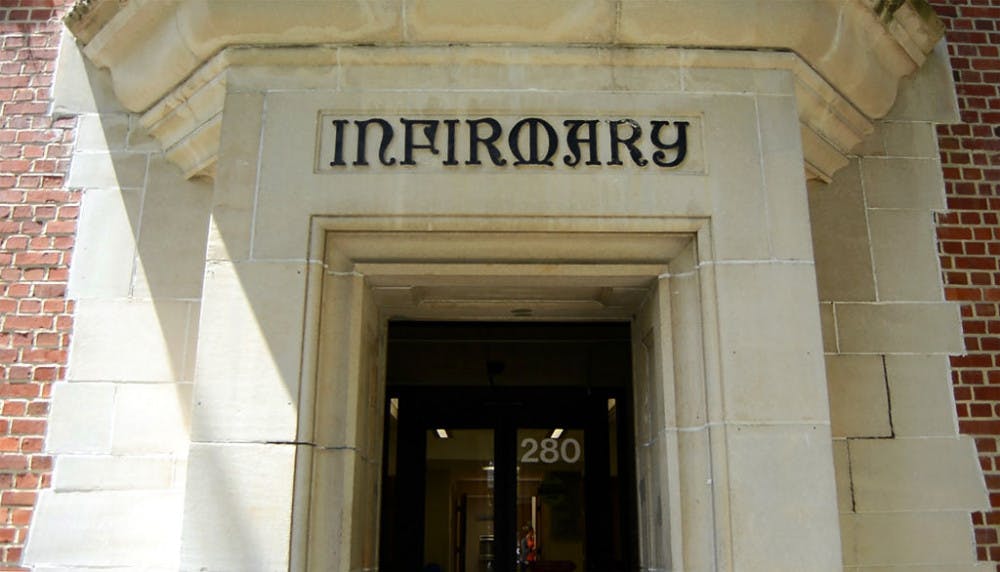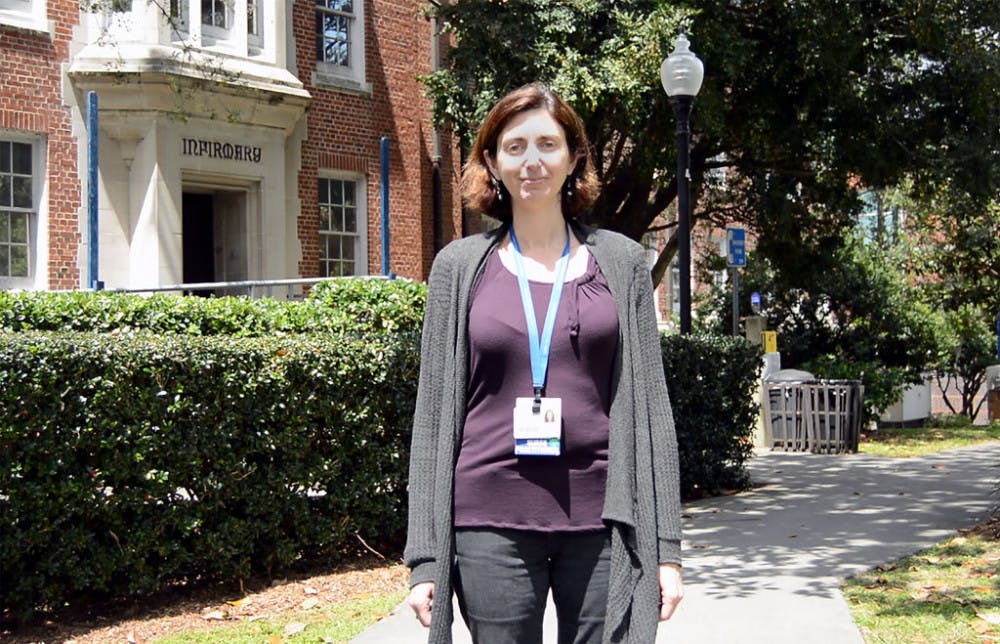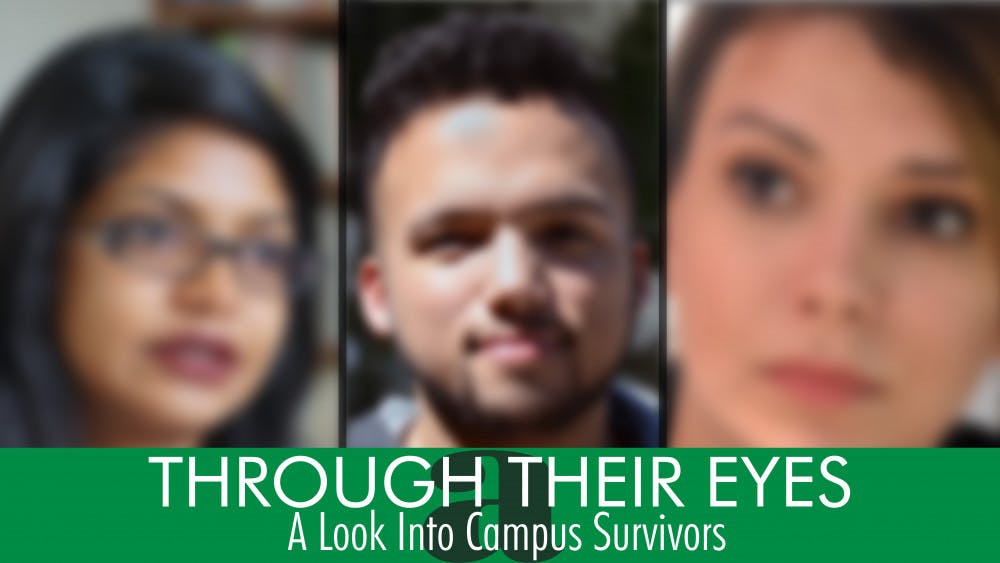Editor's note: This is part of an ongoing series on sexual assault survivors. See Thursday’s paper for an overview of the legal options and processes that survivors experience.
Annie Carper always asks before she holds their hand.
It’s a different person each time, waiting in an examination chair.
But while the person is different, each one is a survivor of sexual assault.
And Carper will only be there if they ask.
“They have chosen me — most likely a stranger — to be with them in one of the most intimate and difficult experiences they have maybe ever been through,” she said. “I always tell my clients that it’s a privilege to be with them in that place.”
• • •

A victim advocate at UF for the past year and a half, Carper is one of the faces survivors see as they begin recovery — working through the initial medical examinations in the aftermath of an assault.
Carper’s goal is to help empower the survivors and give them back control of their lives.
The survivor dictates how involved Carper is in their recovery.
“A lot of that depends on if there is other support available or if I’m the primary source of support,” she said.
The norm, though, is for Carper to be right beside the survivor, their fingers laced together while a sexual assault nurse gathers evidence for a rape kit.
A familiar face in the examination room for Carper isnurse practitioner Jennifer Donelan, who is one of two nurses in the Student Health Care Center qualified to perform forensic sexual assault exams.
No survivor has to pay for an exam, and the clinic does everything it can to alleviate other costs that may arise, such as prescriptions and follow-up services, Donelan said
“Cost is not something we want people to be limited by,” she said.
The result is more people than ever coming forward to report incidents and have exams performed, especially since a forensic exam is covered for survivors at both the SHCC on campus and UF Health Shands Hospital.
Carper said about 250 students came forward last year for victim advocate services.
She said she believes that number will increase because students are becoming more aware of their options in a changing culture.
For that reason, the Office of Victim Services is hiring a third advocate to join Carper and her fellow advocate, Naomi Phineas.
“I think for a long time the culture of reporting sexual violence in particular was very much centered around the victim and what they may have done to be in that situation,” Carper said. “We are creating an environment that is more conducive of people coming forward.”
Donelan said she agreed. The increase in number is not due to more assaults but an increase in people recognizing it is not their fault when this happens, she said.
“They’re sort of understanding the definition of assault and the definition of consent better than they used to and feeling safe reaching out,” she said.
But, for Carper, the feeling of clammy hands, shaky breaths and heartbreaking stories never gets easier.
“You wish that you could fix it,” she said. “You wish that you could take away that pain and suffering.”
• • •

Jennifer Donelan, a UF Women’s Clinic nurse practitioner and trained sexual assault nurse examiner.
Every time Jennifer Donelan tears open a rape kit, she plays two parts.
She is a nurse practitioner, and she is a human.
She knows that behind every new rape kit is a new person with a heartbreaking story, but she also knows it is her job to collect evidence to help them.
The navy blue examination chair sits in the center of her office, her desk only an arm’s length away.
It’s an examination area where Donelan treats women for birth control, sexually transmitted infections, gynecology and other health needs.
It’s also where she performs forensic exams collecting evidence from sexual assault survivors.
She focuses on gathering as much evidence as she can.
As she pulls out a black comb, she collects pubic hair and swabs for DNA residue.
For about two hours she listens to her patient’s story as she examines and documents every bruise, scratch and memory of that person’s sexual assault.
She closes the rape kit with bright red seals and protects it until law enforcement picks it up. Even if a survivor hasn’t made a decision to press charges, a completed rape kit can be held in evidence.
“I always tell people it’s fine to not want to,” she said. “The one thing to know is that it gives you options later. We often see that after a while when things soften out and people have thought about things, sometimes they want to have those options available.”
• • •
This semester, the clinic has completed only two rape kits, despite the high statistical prevalence of sexual assault among students.
“It’s very intense,” Donelan said. “They’re at their most vulnerable when they come in this situation. I’m mostly just very grateful that I am able to provide something to them.”
However, a survivor can only go to the Women’s Clinic, located at 280 Fletcher Drive, Monday through Friday between the hours of 8 a.m. and 5 p.m. to have a rape kit examination.
Those who can’t be treated by the nurses at the SHCC are sent to the emergency room at Shands, Donelan said.
There are more trained sexual assault nurse examiners who are on call to respond to sexual assault cases.
Of the patients Donelan has seen, none have been male.
“I don’t love the fact that we are housed in the Women’s Clinic for that purpose,” she said.
Men less commonly report their assault, Donelan said, but she is trained to perform an exam on a man if needed.
“We can certainly perform a forensic exam on anyone regardless of their gender identity in exactly the same way,” she said. “You can swab anywhere that was involved in an assault, and the actual paperwork that we use to document injuries have both male and female figures.”
She and the clinic’s other trained nurse practitioner, Susan Ryals, have performed nine rape kit exams this school year. The numbers vary by semester, Donelan said.
The clinic has also seen eight sexual assault patients this school year who were treated for care related to sexual assault but chose not to have an exam done.
“That’s one of the reasons that we have to send so many to the ER,” she said. “There are only two of us, and we’re also doing our normal daily activities.”
Because the number of survivors coming forward is increasing, a third nurse will begin the 40-hour sexual assault examination training in May, Donelan said.
Even as more survivors are coming forward and a third nurse is joining Donelan, she can’t help but worry about the future in a world where people still often disregard consent
“It’s very intense emotionally,” she said. “It’s part of our job. I definitely go home on a day after I’ve done one of these exams and hug my kids tighter and feel the weight of that responsibility.”
@mollyidonovan
mdonovan@alligator.org
WHO TO CONTACT
Victims Advocate
A Victims Advocate is available 24 hours a day by calling UPD’s Dispatch Center at 352-392-1111. During business hours, Monday to Friday from 8 a.m. to 5 p.m., Advocates can be contacted directly at 352-392-5648. You can email Victim Advocates at annekcarper@ufl.edu and nphineas@ufl.edu
U Matter We Care
You can confidentially and anonymously reach out to the Dean of Student’s Office U Matter We Care team about students who may need help at umatter@ufl.edu
STRIVE
STRIVE peer educators are available to hold open nonjudgmental forums for discussion of issues related to sexual violence. You can contact them at 352-392-1575 or visit their website at gatorwell.ufsa.ufl.edu/strive.
UF LGBT Affairs
Lesbian, Gay, Bisexual and Transgender (LGBT) Affairs provides education, advocacy, and support for lesbian, gay, bisexual, transgender, queer, questioning, and straight-allied students, staff, and faculty at the University of Florida. You can reach the University of Florida LGBT Office at 352-392-1261 or email lbh@multicultural.ufl.edu.
Medical Care
The University of Florida Student Health Care Center leads, collaborates, and excels in the provision of comprehensive services through wellness promotion and compassionate and accessible care. The Student Health Care Center also has a Women’s Health Care Clinic that is a nurse practitioner-run clinic with a female focus. The clinic includes but is not limited to services such as counseling on contraceptive options, sexually transmitted disease/infection (STD/STI) prevention, sexuality and other women’s health, screening, diagnosis and treatment of STDs/STIs, breast exams and instruction in self-examination, pap smears and routine pelvic exams and pregnancy testing.
Counseling Services
The University of Florida Counseling and Wellness Center has professional counselors and therapists on staff and offers individual or group counseling dealing with any form of sexual exploitation or other issues related to victimization. All counseling services are free and confidential. The center has an excellent referral system should your needs be better met by a different agency or program. You can reach the University of Florida Counseling and Wellness Center at:
3190 Radio Road
(352) 392-1575
www.counsel.ufl.edu/cwc
Correction: Jennifer Donelan was incorrectly identified as a doctor. She is a nurse practitioner.






